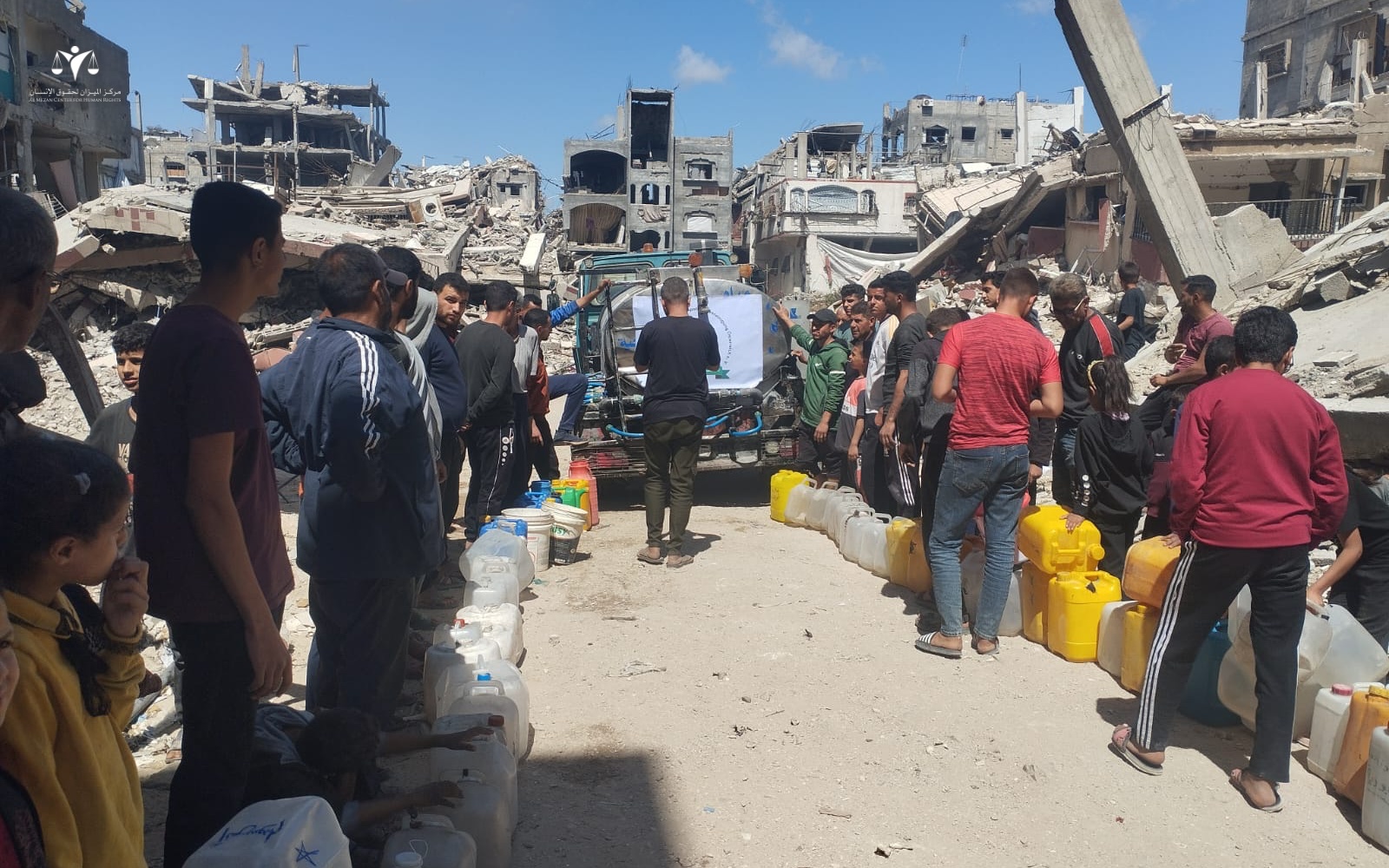إسرائيل تستخدم التعطيش كسلاح وتطلق أوامر إخلاء جديدة تشمل أكبر محطة لتحلية مياه البحر في قطاع غزة
22 يوليو 2025

تواصل قوات الاحتلال الإسرائيلي استهداف البنية التحتية في قطاع غزة بشكل منظم، وتستهدف المرافق الخدمية الحيوية التي لا غنى عنها لحياة السكان، خاصة مرافق المياه والصرف الصحي ومحطات تحلية المياه، وتتعمد استخدام التجويع والتعطيش كسلاح تجاه سكان قطاع غزة، وهي سياسة ممنهجة تصاعدت بشكل خطير في الأسابيع الأخيرة، وتهدف إلى القضاء على السكان كلياً أو جزئياً في سياق جريمة الإبادة الجماعية.
ويعتمد قطاع غزة على ثلاثة مصادر رئيسية للمياه، الأولى وهي المياه الجوفية من خلال 300 بئر موزعة في جميع أنحاء القطاع (290 بئر تتبع للبلديات، و10آبار تتبع للأونروا)، والثانية محطات تحلية مياه البحر الرئيسية، وهي عبارة عن 3 محطات، واحدة في شمال قطاع غزة، وهي متوقفة تماماً منذ بداية حرب الإبادة، وفي وسط قطاع غزة وفي الجنوب ويعملان بشكل جزئي، والمصدر الثالث، مياه الميكروت التي تورد عبر ثلاث وصلات تزود في الشمال والوسط والجنوب ويقوم الاحتلال بإيقافها او فتحها.[1]
وتقع 80 % من أصول ومرافق المياه والصرف الصحي الآن داخل مناطق الإخلاء، ويشمل ذلك 97 محطة من أصل 121 محطة لتحلية المياه الجوفية (80%)، و52 من أصل 58 خزانا للمياه (90 %)، و302 من أصل 392 بئراً للمياه (77 %)، و58 من أصل 70 محطة لضخ مياه الصرف الصحي (83 %). [2]
كما منع الاحتلال الإسرائيلي إدخال 12 مليون لتر من الوقود شهرياً، وهي الكمية اللازمة لتشغيل الحد الأدنى من آبار المياه ومحطات الصرف الصحي وآليات جمع النفايات وباقي القطاعات الحيوية، كما استهدف الاحتلال (112) مصدراً لتعبئة المياه العذبة من خلال مجازر بحق طوابير منتظري تعبئة المياه. كما قام بقطع مياه "ميكروت" – آخر المصادر الأساسية التي تغذي محافظات غزة بالمياه – مما ضاعف من مأساة العطش والمعاناة اليومية.
وزاد من تفاقم الأزمة المائية صدور أوامر إخلاء جديدة لمناطق في مدينة دير البلح أمس الأحد الموافق 20/7/2025، التي تقع فيها محطة تحلية المياه المركزية، مما سيتسبب في توقفها عن العمل، ويجعلها عرضة للتدمير أو الإتلاف والسرقة، إذ تخدم هذه المحطة جميع مناطق وسط قطاع غزة وجنوبه، وكانت حتى مارس 2025، تنتج حوالي 16,000 – 18,000 م³ من المياه يومياً، بفضل اعتمادها على الكهرباء الإسرائيلية، وبتاريخ 9 مارس 2025، قطع الاحتلال آخر خط كهرباء كان يغذي المحطة، وأصبحت تعتمد على الطاقة الشمسية، ما أوقف إنتاج كميات كبيرة من مياه الشرب وانخفض الإنتاج إلى نحو 2,500 م³ يومياً.
أفاد المهندس عمر شتات، نائب المدير التنفيذي لمصلحة مياه بلديات الساحل أنه وفقاً لأوامر الإخلاء الأخيرة للمناطق الغربية الجنوبية من دير البلح، فإن محطة تحلية جنوب غزة لتحلية مياه البحر قد أصبحت ضمن منطقة الإخلاء المعلن ... وهي تنتج من 2500-3000 متر مكعب يومياً من المياه المحلاة بواسطة التشغيل من خلال مولدات الكهرباء الاحتياطية، وفي حال توصيلها بالكهرباء تصل إلى 20000 متر مكعب في اليوم، وهذا ما حصل عند توصيلها بالكهرباء في الفترة من نوفمبر 2024 حتى مارس 2025، وأوقف إسرائيل تزويدها بالكهرباء بتاريخ 9/3/2025.
وتمثل هذه المحطة أكبر مصدر للمياه المحلاة ما تزال قيد التشغيل في قطاع غزة، وتخدم أكثر من 200,000 نسمة من السكان والنازحين بمياه الشرب المحلاة في الوقت الحالي، وذلك من خلال النقل بالصهاريج أو الضخ المباشر عبر شبكات توزيع المياه، وفي حالة إعادة ربطها بالكهرباء مرة أخرى سيكون عدد المستفيدين حوالي 700,000 نسمة يومياً. وفي حالة توقفها عن العمل ستكون البدائل المتوفرة من محطات تحلية محدودة وغير كافية لتغطية حاجة السكان والمهجرين، بالأخص في المحافظة الوسطى، إذ قطعت إسرائيل خطوط مياه ميكروت منذ أكثر من خمسة أشهر، وإذا توقفت المحطة الوحيدة عن العمل فإن السكان والمهجرين سيكونون أمام كارثة حقيقية.
وفي ظل العدوان الإسرائيلي على قطاع غزة منذ السابع من تشرين الأول/أكتوبر 2023، يعاني 91% من الأسر في قطاع غزة من انعدام الأمن المائي، حيث يتلقى 65% من السكان في غزة من 3-5 لترات للفرد يومياً لأغراض الشرب والطبخ، في حين يتلقى فقط 35% من سكان غزة أقل من 15 لتراً للفرد يومياً لأغراض الشرب والطبخ والنظافة الأساسية، وهي أقل من الحد الأدنى الإنساني المطلوب في حالات الطوارئ وفقاً لمنظمة الصحة العالمية.[3]
وتعد هذه النسبة أقل من الحد الأدنى المطلوب للبقاء على الحياة في حالات الطوارئ وفقاً لمؤشرات منظمة الصحة العالمية، ويعود ذلك أساساً إلى الأضرار التي لحقت بالبنية التحتية، وانقطاع التيار الكهربائي التام واللازم لضخ المياه من الآبار، وتشغيل المرافق المائية ذات العلاقة من خزانات ومحطات للضخ، والقيود المفروضة على توفير الوقود والمواد اللازمين لتشغيلها.[4]
وعليه، يطالب المركز المجتمع الدولي بالتدخل لإجبار إسرائيل على وقف جريمة الإبادة الجماعية، وتنفيذ وقف فوري لإطلاق النار، وإلزامها للامتثال لقرارات محكمة العدل الدولية التي فرضت تدابير مؤقتة لمنع ارتكاب جريمة الإبادة الجماعية، والعمل على تمكين الجهات المختصة من تقديم خدماتها المنقذة للحياة، لا سيما وكالات الأمم المتحدة المختلفة، وعلى رأسها وكالة غوث وتشغيل اللاجئين الفلسطينيين (الأونروا)، وفك الحصار، والسماح بتدفق المساعدات الإنسانية، وخاصة الوقود اللازم للمستشفيات ومحطات المياه، ومحطات معالجة الصرف الصحي، ولآليات جمع النفايات، والمخابز، وغيرها من المرافق الأساسية.
مركز الميزان لحقوق الإنسان، إذ يدين استمرار استخدام إسرائيل التجويع والتعطيش كسلاح، فإنه يحذر في الوقت نفسه من وقوع كارثة إنسانية عنوانها الموت عطشاً، نتيجة سياسة متواصلة منذ بدء الهجوم العسكري الحالي، وتتصاعد بسبب إغلاق المعابر وتشديد الحصار، وتعمد استهداف مصادر الغذاء والمياه، ما يتهدد حياة مئات الآلاف من الفلسطينيين في قطاع غزة.
وعليه، يجدد المركز مطالبته للمجتمع الدولي بضرورة التدخل الفوري لإجبار دولة الاحتلال على وقف جريمة الإبادة الجماعية، والإقلاع عن استخدام سياسة العقاب الجماعي والتجويع والتعطيش كسلاح، والعمل على حفظ أرواح المدنيين في قطاع غزة من خلال رفع الحصار وضمان استمرار تدفق المساعدات الإنسانية بأقصى حد، وتفعيل آليات المساءلة والمحاسبة، لضمان عدم إفلات المجرمين من العقاب.
بيان جهاز الإحصاء المركزي بمناسبة يوم البيئة العالمي[3]
[4]بيان جهاز الإحصاء المركزي بمناسبة اليوم العالمي للمياه
